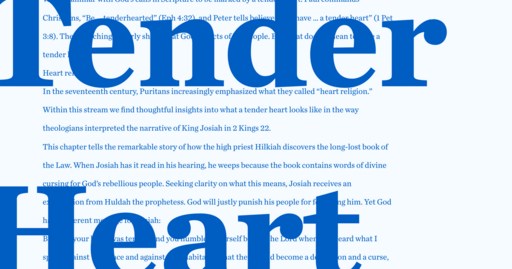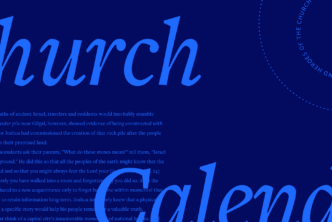We are familiar with God’s calls in Scripture to be marked by a tender heart. Paul commands Christians, “Be … tenderhearted” (Eph 4:32), and Peter tells believers to “have … a tender heart” (1 Pet 3:8). These teachings clearly show what God expects of his people. But what does it mean to have a tender heart?
Heart religion
In the seventeenth century, Puritans increasingly emphasized what they called “heart religion.” Within this stream we find thoughtful insights into what a tender heart looks like in the way theologians interpreted the narrative of King Josiah in 2 Kings 22.
This chapter tells the remarkable story of how the high priest Hilkiah discovers the long-lost book of the Law. When Josiah has it read in his hearing, he weeps because the book contains words of divine cursing for God’s rebellious people. Seeking clarity on what this means, Josiah receives an explanation from Huldah the prophetess. God will justly punish his people for forsaking him. Yet God has a different message for Josiah:
Because your heart was tender, and you humbled yourself before the Lord when you heard what I spoke against this place and against its inhabitants, that they would become a desolation and a curse, and you tore your clothes and wept before Me, I also have heard you. (2 Kgs 22:19 NKJV)
In comments on this verse, Puritan theologians have left us picturesque language that helps us see what a tender heart is and, paradoxically, just how tough it can be.
Tender and tough
What exactly is a tender heart? Jeremiah Burroughs describes it at length:
A tender heart is such a heart as doth easily yield to God, yield to God’s touch. … Lay your finger upon wool and it yields, but lay your finger upon a stone and it will not yield; lay your finger upon flesh and flesh will yield, but lay your finger upon iron and that will not yield. A heart that yields to God—that’s the soft, tender heart; and the heart that holds out against God—that’s the hard heart. When a man will easily yield to the touch of God’s word, he shall easily be convinced by God’s word.1
Tenderness is yielding to God’s impressions on us—especially impressions from his word.
Stephen Charnock also highlights the power of a tender heart:
Judea was ripe for the sickle, but God would put a lock upon the torrent of his judgments that they should not flow down upon that wicked place, to make them a desolation and a curse, as long as tenderhearted Josiah lived, who had humbled himself at the threatening and wept before the Lord (2 Kings 22:19–20).2
The imagery here is pregnant: What substance is tough enough to hold back the raging waters of God’s righteous judgment? The ironic answer is not an iron heart but a tender heart.
What substance is tough enough to hold back the raging waters of God’s righteous judgment? … A tender heart.
Bible study
One of the benefits of drawing on past Christian writings is that their vivid images help us grasp the meaning of a text more concretely. They articulated insights in ways modern writers rarely do, if only because they spoke in different rhythms than we do today. And while the dissonance of such language may present its challenges, sometimes the otherness itself is what’s most memorable.
In this case, these interpreters of Scripture help us understand what the religious word tenderhearted means. The tenderhearted receive the impressions of God and yield to his hand, and, counterintuitively, such a tenderness toward God powerfully moves the Lord. In this way, Christians long gone can enrich our Bible study today.
Related resources
- Piercing Heaven: Prayers of the Puritans
- A Quest for Godliness: The Puritan Vision of the Christian Life
- Puritan Resources: Go Beyond the Valley of Vision
- Jeremiah Burroughs, Gospel-Fear, Or, the Heart Trembling at the Word of God, evidenceth a Blessed Frame of Spirit (London: J.D. Fox, 1674), 116.
- Stephen Charnock, The Existence and Attributes of God, ed. Mark Jones, Updated and Unabridged., vol. 1 & 2 (Wheaton, IL: Crossway, 2022), 1590.







